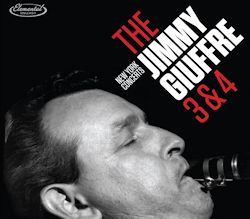Syncopate (2 versions)
Crossroads
Drive (2 versions)
Quadrangle (2 versions)
Angles (2 versions)
Three Bars in One
Cry, Want
Jimmy Giuffre (clarinet, tenor saxophone): Richard Davis (bass): Joe Chambers (drums), recorded at Judson Hall, NYC, September 1965
Jimmy Giuffre (clarinet, tenor saxophone): Don Friedman (piano): Barre Phillips (bass): Joe Chambers (drums), recorded at Wollman Auditorium, Columbia
University, NYC, May 1965
ELEMENTAL MUSIC 5990425
[2 CDs: 36:29 + 50:24]
Preferring the name ‘abstract’ to ‘free’ Jimmy Giuffre spent a decade, from 1962 to 1972, without making a studio recording but pursuing a profoundly
original path. To be sure, it was one influenced by Ornette Coleman but it largely remained on the periphery of his discography. This was because many live
tapes weren’t released, and that is the case with this twofer – the tapes having only been rediscovered in 2012. They were recorded by George Klabin in
1965 and the two concerts took place at Wollman Auditorium, at Columbia University in May 1965 and over three months later at Judson Hall, NYC. There is
considerable reportorial overlap between the two concerts but because of the particular circumstances of each concert and, especially, because of the
changed personnel, each performance, whilst retaining strong structural or motivic similarities, occupies a profoundly different aura.
For the earlier concert at Columbia, Giuffre had Don Friedman on piano, Barre Philips on bass and Joe Chambers at the drums. They play six pieces, of which Syncopate, Quadrangle, Angles and Drive reappear at Judson Hall. Friedman was a key reason why the music emerges so differently, as in
the later concert a pianist was dispensed with. His complex but terse harmonies add something tangibly important and Barre Phillips’ command of the bass
register meshes perfectly in the ensemble anchored by Chambers’ shifting patterns. Giuffre sounds inspired by the playing of his confreres, his own
reaching an apex of lyrical geometry on Three Bars in One where his excursion into tenor honking offers another a startling auditory experience.
It’s also good to hear him back on tenor after so many years solely devoted to clarinet, though he also plays the clarinet too, of course. Cry Want indeed opens with strong vestiges of blues clarinet but ventures further afield into allusive – but not strictly free –writing that
always remains cogent: indeed it comes very close to classical methodology. The later group comprised bassist Richard Davis and the drummer was, once
again, Chambers. Again the music is harmonically complex but this concert is that much starker because of the absence of the piano. The freely contrapuntal
interplay between the three is frequently stunning even if it is often a hard listen; it’s music that cleaves to Schoenbergian ideas but its edgy, abstract
quality – relieved though it occasionally is, as in the overblowing on Angles - aligns it to the cutting edge New York avant-garde.
Those familiar with the early Giuffre recordings will, I daresay, simply not recognise him here. Those willing to follow his abstracted explorations in
this excellently realised, splendidly remastered two-disc set with accompanying booklet, will be in for a buffeting, challenging but remarkable couple of
sessions.
Jonathan Woolf
